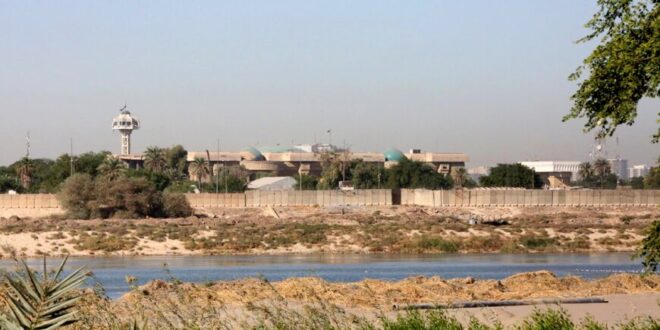In its first press conference, the special committee responsible for investigating the drone attack on the house of Iraqi Prime Minister Mustafa al-Kadhimi released new details and its first public report.
Iraqi national security adviser Qasim al-Araji appeared at a press conference on Nov. 29 to unveil the first report prepared by a special committee tasked with investigating a drone attack on Prime Minister Mustafa al-Kadhimi’s residence earlier this month.
The committee, headed by Araji, was formed a day after the Nov. 7 drone attack to investigate and find the party behind the attack that was widely condemned by the international community.
The members of the committee consist of Army Chief of Staff Gen. Abdul Amir Yarallah, deputy commander of the Joint Operations Command Gen. Abdul Amir al-Shammari, head of the National Security Service Hamid al-Shatri, deputy of the intelligence service Majid al-Dulaimi and Iraqi Foreign Minister Fuad Hussein.
The report revealed new details on the attack.
Araji disclosed that two explosive-laden drones packed with Composition C-4 targeted the prime minister’s residence in the fortified Green Zone in Baghdad in the early hours of Nov. 7. Initially, the first drone aimed its explosives at the flat roof, only to be followed by the second drone immediately targeting the entry of the courtyard.
This style of attack was intended to strike Kadhimi with the second drone while he was fleeing the scene through the entry, the report noted.
Earlier this year, drones were flown over the premier’s house to send him a message, according to a government source who spoke to Al-Monitor on condition of anonymity.
During the press conference, Araji displayed a video of the explosion on the house and revealed the exact time of the incident as 2:20 a.m. Baghdad time. He also showed several photos of the damages to the house and the remaining parts of the explosives and drones.
“The director of explosives control, Maj. Gen. Sabah Hassan al-Shibli, has been arrested and is currently under investigation for tampering with the evidence,” said Araji in the conference.
Araji played the video of Shibli holding the rocket in a careless manner only to detonate the C4-packed rocket a few hours later in the Tigris river.
The rocket should not have been detonated in the river and should have been kept as evidence for further investigation. Gen. Shibli also neglected to collect any fingerprints before detonating the rocket, Araji said.
The committee did not point fingers at any party, as Araji explained that it takes more time to conclude the investigation and the case will remain open until the perpetrators are arrested.
Yesterday, the leader of Asaib Ahl al-Haq, Qais Khazali, who also is one of the suspected parties involved in the assassination, said in a live TV speech that “the assassination is nothing but a fake operation.”
However, the report provides compelling evidence that the assassination attempt on the prime minister’s life was carefully planned and showed a degree of technical sophistication.
The attack was widely condemned by the international community, including the United Nations, the United States, and the majority of Western and Arab countries, as well as Iran and Lebanon’s Hezbollah.
Some of the Iraqi militias linked to Iran spread misinformation following the attack and slammed the assassination attempt as a phony operation conducted by the government.
Khazali threatened to wage war, saying, “The attempt to accuse the resistance factions of targeting the PM’s house is an attempt to play with fire; it is an attempt to drag the country into a huge crisis.”
The assassination attempt took place after militias marched to the gates of the Green Zone to protest the preliminary election results that projected Khazali and his militant allies among the defeated parties. Protestors then violently attacked anti-riot forces by throwing rocks, and the clash resulted in two dead and many injured on both sides.
A day before the assassination attempt, Kahzali appeared among his protestors at the gates of Green Zone and threatened to take revenge by attacking Kadhimi and all American bases.
An anonymous source in the Iraqi security forces who asked not to be identified for security reasons informed Al-Monitor that a new report will be released later this week that militias purposely escalated violence against the security forces to pressure the government to alter the election results in their favor. The militias claimed the election was rigged and called for a new vote.
However, the elections were praised by the international community as sound and fair. Last week, in a briefing before the Security Council, United Nations Mission Representative in Iraq Jeanine Hennis-Plasschaert confirmed that the elections were conducted without any evidence of fraud.
 Eurasia Press & News
Eurasia Press & News




